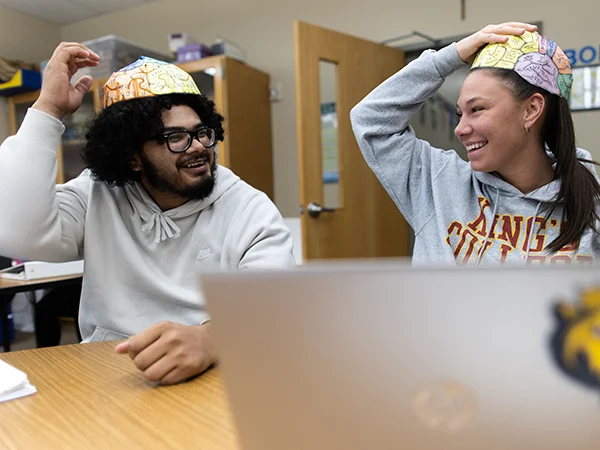Education Degree

Program Overview
Do you remember that special teacher who made a difference in your life? Perhaps it was a first-grade science teacher who sparked your love of biology. Or a high school English teacher who recognized your creative potential and inspired you to hone your writing skills.
Educators shape lives, ignite passions, and instill knowledge that lasts a lifetime. At King's College in Wilkes-Barre, Pa., we want to help you become that transformative influence in a student’s life.
We offer a diverse selection of education degree programs, whether you’re seeking certification in elementary, middle, or secondary education. Regardless of which certification you choose, our coursework ensures you acquire the skills and knowledge needed to excel in your chosen field.
We welcome you to join our community of educators, learners, and visionaries. Together we can shape the future by nurturing young minds and empowering the next generation!

What Can You Do with an Education Degree?
Pursuing a bachelor’s degree in education opens multiple rewarding career paths. For many students, a major in education is the first important step to landing their dream teaching job. Education graduates are also hired by businesses that sponsor tutoring or test preparation services. Other graduates from the PK-4 major go on to operate childcare centers. Graduates also find positions in boards of education, community organizations, museums, professional organizations, or overseas language schools.
Related positions are also available in bookstores, educational supply companies, or textbook publishers. Becoming a management trainee or providing professional development for corporations is another opportunity for students who pursue an education major. Students interested in educational policy even go on to law school or work for various government agencies.
Additional education careers for students who continue to a master’s degree include special services positions in the schools, including reading specialist, guidance counselor, school psychologist, English as a Second Language instructor, and curriculum supervisor to name a few.
Top Education Career Paths
- Classroom teacher
- Special education teacher
- Reading specialist
- School counselor
- ESL teacher
- Educational consultant
- Educational researcher
- Curriculum developer
- Higher education instructor
- Adult education instructor
- Education writer/journalist
- Museum educator
- Educational content developer
- Online course developer
- Educational technology specialist
- Superintendent, principal, or educational institution administrator (with advanced degrees and/or certifications)
Top Education Employers
- School districts and universities
- Education app/tutoring companies
- Public libraries
- Non-profit organizations
- Law firms
- Freelance/self-employment
- Government
- Museums
What Makes the King’s Education Program Different?
Our commitment to fostering exceptional teachers is ingrained in every level of our education degree program. The Education Department of King’s College is small enough to offer individual attention but large enough to be well-staffed and equipped. All full-time faculty members are credentialed at the doctoral level or have exceptional expertise in educational theory, and practice.
Here's what sets our education program apart:
- Global perspectives from study abroad opportunities and connections to Australian schools.
- Undergraduate research projects, presentations, and publications at local, state, and national levels.
- Key scholarship initiatives at the state and national level including the PA T.E.A.C.H., Federal TEACH, and Noyce Scholar programs.
- Individualized attention which is grounded in the Holy Cross charism of championing the inherent dignity of every person.
- Comprehensive age-level preparation: Whether your calling is to teach children in early learning centers or to inspire high school students, our program prepares you for success at any age level.
- Student-centered faculty: Our dedicated faculty members are passionate about your growth and success. With a student-centered approach, they ensure you're equipped with the skills and knowledge needed to excel as an educator.
- Personalized education advisor: Every student is paired with an experienced education advisor who collaborates with you to craft a personalized plan for your future success. This tailored guidance ensures you're on the right track to achieve your goals.
- Small class sizes: Our small class sizes mean more individualized attention and close relationships with your professors. At our campus in Wilkes-Barre, you'll receive personalized guidance and mentorship that empowers you to excel in your chosen area of education.
- Accelerated pathway to earning a master's degree. Students can earn a bachelor’s degree with a double major in Education Grades PK-4 and Special Education PK-12, and a master’s of education degree in reading in only 5 years when enrolled in the Five-Year B.A./M.Ed. in Reading Program.

The faculty of King’s College has truly surpassed any expectation in preparing me as an educator, an administrator, and a person. As someone who decided to change my declared major in my undergraduate degree, I owe much of my success in my nine-year career as an educator to the faculty members who invested their time to help me find my true passion. The unwavering support of the faculty, the networking opportunities afforded to me, and the guidance continuously extended to me as an alumnus makes me incredibly proud to call King’s College my alma mater and second home.

Education Program Description
The education curriculum at King's College is designed to empower future educators with the content expertise and skills necessary to thrive in diverse educational settings. We emphasize practical experience, theoretical foundations, and hands-on learning to ensure graduates are well-prepared to make a positive and lasting impact in the field.
After 48-60 credits, students can formally apply to the education program by the end of their sophomore year.
All education students take a minimum of 37 hours of professional education courses. Students must also meet the Commonwealth of Pennsylvania’s requirements at the time of certification. These requirements include six credits in mathematics (numbered 100 or above at King’s) and six credits in English (three in writing and three in literature).
Our teaching candidates access field experience early in the education major so they can practice what they learn in the classroom. Field experiences typically begin during the second semester of the first year or the first semester of the second year and continue throughout the rest of the program. As a culmination of their work, candidate students teach at a local school, usually during their last semester.
Degrees Offered
-
PK-4 Education
-
PK-4 and Special Education PK-12
-
Special Education PK-12
-
5-Year Program in PK-4, Special Education, and Master’s in Reading
-
Grades 4-8 in Mathematics or Science
-
Biology Secondary Education
-
Chemistry Secondary Education
-
English Secondary Education
-
French Education K-12
-
General Science Secondary Education
-
History Secondary Education
-
Mathematics Secondary Education
-
Physics Secondary Education
-
Political Science Secondary Education
-
Spanish Secondary Education
Certification Coursework Offered
In addition, we offer courses that are tied to undergraduate majors that lead to certifications in various content areas. These include:
- Citizenship/Social Studies Grades 7-12 (with a major in History, Political Science, Economics)
- General Science Grades 7-12
- Biology Grades 7-12
- English Grades 7-12
- Mathematics Grades 7-12
- Chemistry Grades 7-12
- French Grades PK-12
- Physics Grades 7-12
- Spanish Grades PK-12
- Special Education PK-12
- Health and Physical Education PK-12
The department of education also offers the coursework required for the Child Development Associate (CDA) Credential and the Director’s Credential.
Graduate Coursework Leading to Additional Certifications, Endorsements, etc.:
- Autism
- STEM
- Instructional Coaching
- ESL
- Reading Specialist
The Program for Teacher Education is approved by the Pennsylvania Department of Education and meets the educational requirements to obtain teacher certification in Pennsylvania. Determinations regarding professional licensure and/or certification eligibility associated with this program are outlined below.
With Pennsylvania Certification, the Teacher Education Program meets the educational requirements for teaching certification in the following states: Arizona, Arkansas, California, Colorado, Connecticut, Delaware, Florida, Georgia, Hawaii, Idaho, Illinois, Indiana, Iowa, Kansas, Kentucky, Louisiana, Maine, Maryland, Massachusetts, Michigan, Minnesota, Mississippi, Missouri, Nebraska, Nevada, New Hampshire, New Jersey, New York, North Carolina, North Dakota, Ohio, Oklahoma, Oregon, Rhode Island, Tennessee, Utah, Vermont, Virginia, Washington, West Virginia, Wisconsin, and Wyoming. The Teacher Education Program also meets the educational requirements for teaching certification in the District of Columbia.
To obtain teaching certification in Alabama, Alaska, Montana, New Mexico, South Carolina, South Dakota, or Texas, students must complete additional educational requirements. Students who are planning to teach in one of these states are encouraged to familiarize themselves with the educational requirements in the relevant state. The state’s Department of Education can provide this information.
This information is, to the College’s best understanding, accurate and current. It is strongly recommended that students pursuing employment outside the state of Pennsylvania exercise due diligence regarding examination of state-specific educational requirements related to professional licensure.
Additional Info
Formal Entry to Upper-Level Course Work
Act 55 of 2022 Basic Skills Assessment Moratorium
Act 55 of 2022 signed into law by Governor Wolf on July 8, 2022, requires the Secretary of Education to waive the requirement to satisfactorily complete the assessment of basic skills required under section 1207.3 and 22 Pa. Code § 49.18(c) (relating to assessment) for three years from July 8, 2022 through July 8, 2025. This applies to all students who enter preparation programs during this period as well as otherwise qualified candidates for licensure who make application during this period.
Formal Acceptance into the Undergraduate Teacher Education Certification Program
Noyce Scholars Program
Assessment System
The King’s College Education Department has an assessment system that collects and analyzes data on applicant qualifications, candidate and graduate performance, and unit operations to evaluate and improve the unit and its programs. King’s faculty and local school faculty will use performance-based assessments to assess education students during courses, field experiences, and advisement sessions. To pass through the assessment, students will be expected to demonstrate satisfactory development of a teaching portfolio (as determined by the student’s advisor during advisement sessions), earn a C or better in all education classes, and meet other requirements outlined in the Teacher Education Handbook. Students will also be required to take the appropriate PRAXIS II or PECT Tests during their final semester at King’s College.
Basic Requirements
Preparation for certification must include at least 60 semester hours of general education. The distribution of the courses will cover the humanities, social sciences, and natural sciences and conform to the college’s Core Curriculum. Students seeking certification in secondary education will major in one of the following content areas: Biology, Chemistry, English, General Science, History, Political Science, Economics, Mathematics, or Physics. Foreign Language certification (PK-12) is offered in Spanish and French. At King’s, students pursuing a certificate in Citizenship Education will major in history, political science, or economics and complete additionally prescribed courses for a social studies core.
All education students will take a minimum of 37 hours of professional education courses. They will include courses in educational foundations, field experiences, reading skills, educational psychology, teaching diverse students, general and special methods of teaching, teaching the exceptional child, and student teaching practices.
All students seeking certification must meet the Commonwealth of Pennsylvania’s requirements at the time of certification. Currently, these requirements include six credits in mathematics (numbered 100 or above at King’s) and six credits in English (three in writing and three in literature).
Student Teaching
During the senior year all students in the teacher education certification program are required to participate in a professional semester. This includes a student teaching orientation followed by supervised full-time student teaching with diverse students. Education majors are placed in student teaching positions at various early childhood, elementary, middle schools, and high schools in a thirty-mile radius of King’s. Education majors are required to apply for student teaching with the field experience coordinator no later than 6 p.m. on the second Monday of May for the following fall semester or 6 p.m. on the second Monday of November for the following spring semester. During the student teaching semester, students are discouraged from taking any course except EDUC 440, Inclusive Education. In order to be eligible for student teaching, students must have satisfied all content areas and education coursework and have met all requirements outlined on the student teaching application.
Student Resources
- Flood Handbook - 2022–2023 Academic Year
- Student Teaching Handbook - Candidate Version - 2024 Academic Year
- Student Teaching Handbook - Professional Partners Version
- Teacher Education Handbook, Fall 2024
- Post Baccalaureate Handbook - 2023–2024 Academic Year
- Pre-Student Teaching Handbook
- Pre-Student Teaching Handbook - Middle Level
- Pre-Student Teaching Handbook - Secondary
- Flatsheet(s)
- Internships
- Study Abroad
Related Information
- Pre School - Grade 4/ Special Education
- Secondary Education
- Secondary Special Education
- Program Planners
Fall 2025 Student Teaching Requirements
Clearances
Observation Forms
- King’s College Observation Evidence Form - Domains 1 and 4
- King’s College Observation Evidence Form - Domains 2 and 3
- King’s College Student Teacher Evaluation Rubric
Teacher Work Sample Rubrics
Special Education Portfolio Rubric
- Special Education Portfolio Guidelines
- Special Education Portfolio Appendices
- Special Education Portfolio Rubric
Miscellaneous Forms
- Application to the Teacher Education Program
- PDE 430 Midterm and Final Evaluation Form
- Certification Information
- College Catalog ('23-'24)
- Exit Criteria
- Process for formal admission to the Teacher Education Program
- General Field Experience Time Sheet Form
- King’s College Lesson Plan Template
- King's College Teaching Lesson Plan
- King's College Lesson Plan Rubric
- Photo/ Video Release Pre-Student Teaching PK-4
- Progression Criteria for Certification Programs
- Videotape Permission Form
Request Information
Our admission team is ready to answer your questions about this academic program!
Request Information HereVisit Us
We welcome all potential students and their families to visit our beautiful campus and get a taste of the King’s College experience. Feel free to schedule a personal visit or register for one of our upcoming admission events.


